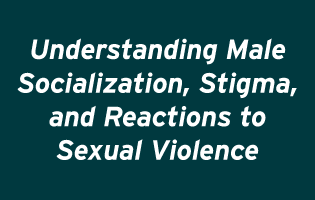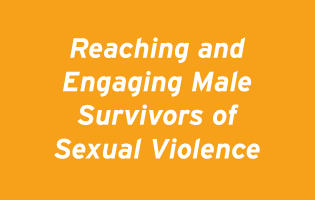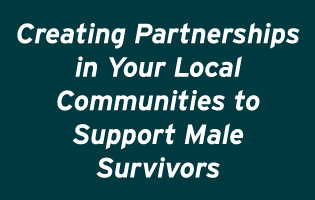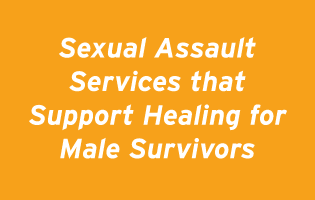
When it comes to sexual assault, abuse, and harassment, men are taught to not identify as victims. Men tend to be taught to suppress emotions, avoid vulnerability, and not ask for help. Men may feel the need to be silent about their abuse because of the internalized belief that men can’t be victims, or that men should not express weakness. This type of socialization depicts victimization as feminine, and uses shame as a tool to suppress behaviors and feelings associated with femininity. Avoiding femininity and practicing stereotyped male gender roles helps men maintain power, or at least the perception of what power and safety might mean. When a man does want to reach out to ask for help related to his victimization and healing, he may not have the language to understand or talk about what happened. Men may even express an attitude of “no big deal” related to sexual violence.
If and when men do start to speak openly about being sexually victimized, it may be in more graphic terms than when women discuss their experience of sexual abuse. Men are socialized to want sex, so it can be confusing to experience unwanted sexual contact. Some men may wonder what that means for their own masculinity, or what it means for their sexual identity. Men may internally ask questions like, “Who am I if I embrace victimization? Would that make me less of a man?”
Some men may not identify what they experienced as sexually inappropriate if it took place as part of a ritual or tradition, as in the case of hazing, for example. Some men may question that sexual assault could have happened if part of it was enjoyable, or if they became physically aroused.
One of the most socially acceptable emotions for men to express publicly is anger. If and when male survivors seek healing related to sexual assault, anger may be the most accessible way to communicate about pain and confusion. Advocates likely have negative feelings about approaching male anger, so it will take practice to avoid approaching this anger with fear. To work effectively with male survivors, become comfortable with powerful emotions being expressed. Grief and fear are often behind anger.
While there are many common themes surrounding male socialization, remember that the social category “male” encompasses a broad, diverse range of people, who have lots of other identities and experiences that impact response to violence. Race, culture, disabilities, gender identity, sexual orientation, and age are just a few factors that impact the way a male survivor has been socialized.
Assessing Our Capacity for Serving Male Survivors of Sexual Violence – Assessment tool
Sexual assault advocates and rape crisis centers can use this self-assessment tool to reflect on your current work serving men who have had unwanted sexual experiences. The tool offers reflection questions related to individual and organizational capacity to serve male survivors.
Working with Male Survivors: Healing at Sexual Assault Centers and Beyond – Podcast
Sharon Imperato, Project Director of Clinical Training and Technical Assistance at the Boston Area Rape Crisis Center, and Jim Struve, executive director of MenHealing, talk about working with male survivors of sexual assault. They share their history of collaboration, approaches to working with male survivors, and sexual assault center services that support men in healing from sexual trauma.
Working with Male Survivors: How Sexual Assault Impacts Transgender Men – Part 1 – Podcast
michael munson, executive director of FORGE, talks about working with transgender men and transmasculine survivors. In this first part of a two-part conversation, michael talks about foundational concepts of gender relevant to working with trans men and transmasculine folks, and common reactions to sexual assault that may be especially relevant for advocates to understand in working with trans men and transmaculine survivors.
Working with Male Survivors: Talking to Men with Disabilities About Sexual Assault – Podcast
Leigh Ann Davis, director of criminal justice initiatives at The Arc of the United States, and James Meadours, is a board member on Texas Advocates and a national advocate for healing from sexual assault and the rights of people with intellectual disabilities, talk about working with male survivors of sexual assault who have disabilities.
Working with Male Survivors: Understanding Expressions of Trauma for Men – Podcast
Kenton Kirby, Director of Practice at the Center for Court Innovation, addresses how advocates at sexual assault centers can learn from his work to create safety for a young man who has been harmed to talk about that harm, some of the common ways men express trauma, and more.
7 Toxic Phrases Parents Need to Stop Saying to Their Sons – Article
This 2018 article from the website Fatherly includes tips on communicating with sons in ways that don’t reinforce negative stereotypes about maleness and masculinity.
An NFL player says United ignored his reports of sexual assault. The problem’s bigger than him. – Article
In this 2020 article, the writer Mychal Denzel Smith addresses how stereotypes about Black men as hypersexual and violent negatively impact Black male survivors of sexual violence.
Boys And Men Of Color Healing From Systemic And Interpersonal Trauma – Virtual roundtable
This 2020 virtual roundtable from Vera Institute of Justice is an intergenerational conversation on supporting the healing process of male survivors of color. It addresses racial and historical trauma, criminalization and hypersensitivity of Black and brown masculinity, and mass incarceration.
Boys and Sexual Abuse: The Untold Stories of Trauma – Blog
This 2019 blog from Psychology Today explores the psychological effects of sexual trauma.
Boys: The Forgotten Sex Trafficking Victims – Webinar
This 2019 webinar explores current knowledge on boys being victimized through child sex trafficking, and challenges systems face in providing services to survivors.
Gioncarlo Valentine’s Searing Portrait of the Fears of Young Black Men – Article
This 2019 article from The New Yorker includes photographs by Gioncarlo Valentine and exploration of his work. Valentine’s portraits show young Black men expressing fear and vulnerability.
How Toxic Masculinity Hurts Male Survivors — and What Can Help – Blog
This 2019 blog by Sharon Imperato from Boston Area Rape Crisis Center addresses clinical aspects of “traditional masculinity ideology” and implications for working with male survivors of sexual violence.
Men Can Have Better Friendships. Here’s How – Article
This 2019 article, which also includes an audio version, explores male socialization related to friendships, and offers tips for recovering from negative aspects of male socialization. The article includes further reading on masculinity.
Redefining Masculinity: A Conversation With Transgender Men – Video
This 2019 video features transgender men reflecting on their understanding of what it means to be men. The men comment on how culture impacts notions of masculinity.
The Army wants more male sexual assault survivors to file reports – Article
This 2018 article from ArmyTimes describes the U.S. Army’s focus on addressing male-on-male sexual violence. It describes an effort to share stories of sexual violence experienced by men while enrolled in the Army, including hazing, and how that violence has impacted the lives of the victims.
The Epidemic of Isolation Among Young Men – Article
This 2019 article from The Walrus, which also includes an audio version, explores aspects of male socialization that impacts the ability to make friendships, and the consequences of resulting isolation. It includes a discussion of how homophobia keeps men from forming meaningful connections with other men.
Trans Masculine People Share What it Means to be an American Boy – Article
This 2019 article from the website Salty World includes portraits and commentary from transmasculine people from across the U.S.
Vulnerable and Underserved: Victim Advocacy for Incarcerated Male Survivors of Color – Webinar
This 2019 webinar from Just Detention International helps advocates increase their capacity for providing services to male survivors of color who are incarcerated, focusing on how identity and custody status impacts experiences and needs. It also includes information on how to use PREA standards in your advocacy.
Vulnerable and Underserved: Victim Advocacy for Incarcerated LGBTI Survivors – Webinar
This 2019 webinar from Just Detention International offers strategies for using PREA standards as a tool of advocacy for LGBTI survivors who are incarcerated, understanding the high incident of prior trauma among LGBTI survivors who are incarcerated, and evaluating program’s readiness to serve LGBTI survivors.
Vulnerable and Underserved: Victim Advocacy for Incarcerated Survivors of Sexual Abuse Perpetrated by Women – Webinar
This 2019 webinar from Just Detention International helps advocates understand the shame and stigma that male survivors who are incarcerated may experience if they survived abuse perpetrated by women. It also offers strategies for addressing the impact of this form of violence on survivors.
Yes, Sexual Abuse of Black Boys Is a Problem — and We Need To Pay Attention – Blog
This 2017 article from the writer Garfield Hylton addresses the silence around sexual abuse of Black boys, and the impacts on Black men who have survived child sexual abuse. The article draws on research, media portrayals, and personal stories.
For more information please email resources@nsvrc-respecttogether.org
 |
 |
 |
 |
 |
 |
 |
 |
